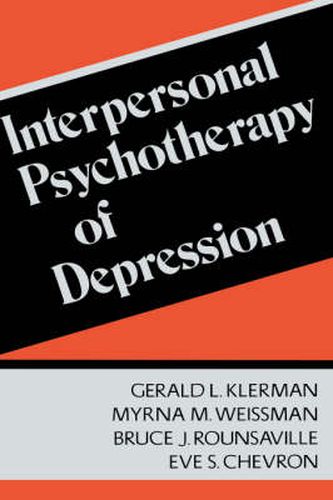Readings Newsletter
Become a Readings Member to make your shopping experience even easier.
Sign in or sign up for free!
You’re not far away from qualifying for FREE standard shipping within Australia
You’ve qualified for FREE standard shipping within Australia
The cart is loading…






Reflecting the new and exciting trends in the treatment of psychiatric patients, this book presents a model of IPT for clinically depressed patients. Gerald L. Klerman, whose research on depression has made him world renowned, and Myrna M. Weissman, who has written, with Eugene Paykel, an important book on women and depression, have worked with their colleagues to present the empirical basis for their new treatment method. This theory builds on the heritage of Harry Stack Sullivan and John Bowlby and their focus on interpersonal issues and attachment in depression. Research shows that four problem areas predominate: grief, interpersonal disputes, role transitions, and interpersonal deficits. The therapist evaluates the need for medication in addition to interpersonal therapy (IPT) and focuses on the patients problem area. Acknowledging that these areas are never mutually exclusive, the authors present a clear treatment strategy for each problem area, augmenting their presentation with a discussion of common problems that arise during IPT.
$9.00 standard shipping within Australia
FREE standard shipping within Australia for orders over $100.00
Express & International shipping calculated at checkout
Reflecting the new and exciting trends in the treatment of psychiatric patients, this book presents a model of IPT for clinically depressed patients. Gerald L. Klerman, whose research on depression has made him world renowned, and Myrna M. Weissman, who has written, with Eugene Paykel, an important book on women and depression, have worked with their colleagues to present the empirical basis for their new treatment method. This theory builds on the heritage of Harry Stack Sullivan and John Bowlby and their focus on interpersonal issues and attachment in depression. Research shows that four problem areas predominate: grief, interpersonal disputes, role transitions, and interpersonal deficits. The therapist evaluates the need for medication in addition to interpersonal therapy (IPT) and focuses on the patients problem area. Acknowledging that these areas are never mutually exclusive, the authors present a clear treatment strategy for each problem area, augmenting their presentation with a discussion of common problems that arise during IPT.